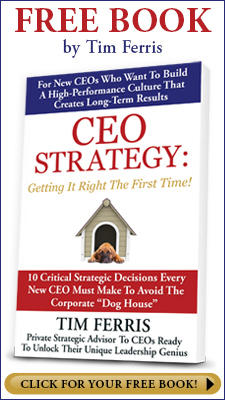“Amber Sherlock asks Tim what lead him to write the book, who it’s aimed at, and what are the big ideas he wants readers to take away.”
Transcription
Amber Sherlock: I’m Amber Sherlock. And welcome to the Trusted Authority Alliance Expert Series Show. We’re here today with Tim Ferris. Tim is Australia’s leading strategic advisor to CEOs. He’s had particular success in leading coaching and developing CEOs who are new to their role and want to unlock their leadership genius. He’s also the author of the book “CEO Strategy – Getting It Right The First Time”. A big welcome to you Tim. Thank you for joining us today. Can you share with the audience a little bit about your story and the success you’ve had in your career?
Tim Ferris: I’ve always been drawn to leadership I think, even since my teenage years – whether it was sporting teams, school groups and the like. I’ve always been attracted to leadership. I can’t always explain why. I think it was around the age of 18 where some key defining experiences to me just said, “I really want to point my life at the people side in growing and developing people”. And I think for me, the idea that, if you can impact a leader, the flow on impact to the people under them makes a difference to a whole lot of people’s lives. So I like going for that pointy end, where you influence one, you influence a whole lot.
Amber Sherlock: So why did you decide to write the book?
Tim Ferris: I have a lot of conversations with a lot of leaders, particularly a lot of CEOs, and there’s a lot of repeat content that I find myself saying over and over again, “…if you can just get this one thing…”, “…if you can just understand this…”, and I thought, “you know what, it’s about time I actually pulled some of those core conversations together”, and then I can hand this to a CEO or prospective CEO and say, “…if you want to understand how I operate and what I can do for you, have a look at this, and then let’s have a chat.”
Amber Sherlock: So is that who the book is specifically aimed at?
Tim Ferris: Particularly for new CEOs at the beginning of their career. If I can help them get it right first up, I think I’m doing them a huge service. I think a lot of CEOs, when they first come to that CEO seat, underestimate how big the leap is from being an Exec to being a CEO, and they probably sat at the table thinking, “… when I get there, I’m going to do a whole lot better than them. And I’ll do this, and I’ll do this.” And then they get there and completely underestimate just how lonely it is. When the buck finally stops with you, and you alone, and everybody else around you wants a piece of you, has an agenda around you and thinks that they can do your job better than you.
Amber Sherlock: What are some other things you’d like your readers to take away from your book? What are some of the big ideas?
Tim Ferris: Particularly for a CEO, I think one of the biggest ideas is that your self-awareness really matters! Every leader has a wake that happens behind them as they go about their day. And often leaders are unaware of it. There’s some research from David Rock who heads up the NeuroLeadership Institute where he measured the importance of self and social awareness as you go up the leadership chain. Obviously, the higher you go up the leadership chain, the more important it is that you’re aware of yourself and your impact on those around you. But the actual feedback data from leaders show that the higher up the food chain you go in corporate life, the lower people’s actual self-awareness is. So the further you go up the line there becomes this increasing gap between what’s needed and what actually is.
Amber Sherlock: So what sort of impact do you think your book will have on your reader and help them?
Tim Ferris: I think the first is opening to the idea that “me as a person” as a leader is important in this whole piece. My business capability, my business acumen, my technical capability may have got me here, but it’s not enough to succeed here, because the need for my technical capability fades away when I’m in that CEO seat, and my ability to harness people’s energy to get a result is what really matters. And so I’d say your self-awareness matters. Who you are as a person matters. But also, your success really comes from your people. One of my favourite authors that I read made this quote that, “There’s no strategy so brilliant that people can render it worthless”. And I’ve just sat back and seen that so many times, sometimes in my own world, and in the lives of clients, where they’ve got this brilliant strategy, “This is so going to work”, and the moment, they put people in front of it, and those people have to solve problems around that strategy, things tend to go to custard.

